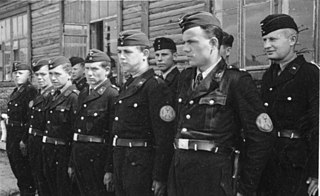 W
WThe Schutzmannschaft or Auxiliary Police was the collaborationist auxiliary police of native policemen serving in those areas of the Soviet Union and the Baltic states occupied by Nazi Germany during World War II. Heinrich Himmler, head of the SS, established the Schutzmannschaft on 25 July 1941, and subordinated it to the Order Police. By the end of 1941, some 45,000 men served in Schutzmannschaft units, about half of them in the battalions. During 1942, Schutzmannschaften expanded to an estimated 300,000 men, with battalions accounting for about a third, or less than one half of the local force. Everywhere, local police far outnumbered the equivalent German personnel several times; in most places, the ratio of Germans to natives was about 1-to-10.
 W
WThe Byelorussian Auxiliary Police was a collaborationist paramilitary force established in July 1941. Staffed by local inhabitants from German-occupied Byelorussia, it had similar functions to those of the German Ordnungspolizei in other occupied territories.
 W
WLatvian Auxiliary Police was a paramilitary force created from Latvian volunteers by the Nazi German authorities who occupied the country in June 1941. It was part of the Schutzmannschaft (Shuma), native police forces organized by the Germans in occupied territories and subordinated to the Order Police. Some units of the Latvian auxiliary police were involved in the Holocaust. One of its units, the Arajs Kommando, was notorious for killing 26,000 civilians during the war, mostly Jews, but also Communists and Romas.
 W
WLatvian Auxiliary Police was a paramilitary force created from Latvian volunteers by the Nazi German authorities who occupied the country in June 1941. It was part of the Schutzmannschaft (Shuma), native police forces organized by the Germans in occupied territories and subordinated to the Order Police. Some units of the Latvian auxiliary police were involved in the Holocaust. One of its units, the Arajs Kommando, was notorious for killing 26,000 civilians during the war, mostly Jews, but also Communists and Romas.
 W
WSchutzmannschaft Battalion 118 was a Schutzmannschaft auxiliary police battalion (Schuma). The core of the Schutzmannschaft battalion 118 consisted of Ukrainian nationalists from Bukovina in Western Ukraine. It was linked to the ultra-nationalist Organization of Ukrainian Nationalists, to its smaller Melnyk wing. 900 members of The OUN in Bukovina marched towards eastern Ukraine as members of paramilitary Bukovinian Battalion. After reinforcement by volunteers from Galicia and other parts of Ukraine, the Bukovinian Battalion had a total number of 1,500–1,700 soldiers. When the Bukovinian Battalion was dissolved, many of its members and officers were reorganized as Schutzmannschaft Battalions 115 and 118. Among the people incorporated into the Schutzmannschaft Battalions 115 and 118 were Ukrainian participants in the Babyn Yar massacre.
 W
WSchutzmannschaft-Brigade Siegling was a Belarusian Auxiliary Police brigade formed by Nazi Germany in July 1944 in East Prussia, from members of six local volunteer battalions of Schutzmannschaft following the Soviet Operation Bagration. The six retreating collaborationist units who joined Siegling included Bataillon 57 (ukrainische), Bataillon 60 (weißruthenische), Bataillon 61, 62, 63 (ukrainische), and Bataillon 64 (weißruthenische).
 W
WThe Ukrainische Hilfspolizei or the Ukrainian Auxiliary Police was the official title of the local police formation set up by Nazi Germany during World War II in Reichskommissariat Ukraine, shortly after the German conquest of the Ukrainian Soviet Socialist Republic in Operation Barbarossa against the Soviet Union, Germany's former co-belligerent in the invasion of Poland.